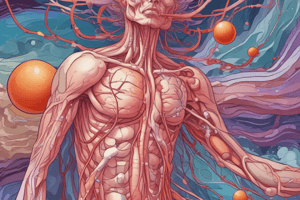Podcast
Questions and Answers
What is a common cause of hypernatremia?
What is a common cause of hypernatremia?
Why do high protein intake and certain protein products lead to dehydration?
Why do high protein intake and certain protein products lead to dehydration?
Where do the blood vessels pour into?
Where do the blood vessels pour into?
Where does the system begin?
Where does the system begin?
Signup and view all the answers
What is a consequence of not increasing water intake when stimulated by thirst?
What is a consequence of not increasing water intake when stimulated by thirst?
Signup and view all the answers
What is required to maintain proper hydration when consuming high protein diets?
What is required to maintain proper hydration when consuming high protein diets?
Signup and view all the answers
What type of connections are formed from the capillaries of the posterior pituitary?
What type of connections are formed from the capillaries of the posterior pituitary?
Signup and view all the answers
Which of the following is NOT a direct cause of hypernatremia?
Which of the following is NOT a direct cause of hypernatremia?
Signup and view all the answers
What is special about this system?
What is special about this system?
Signup and view all the answers
In which organisms is this system found?
In which organisms is this system found?
Signup and view all the answers
What happens to the water in the body fluids?
What happens to the water in the body fluids?
Signup and view all the answers
What is the result of retaining water in excess of solute?
What is the result of retaining water in excess of solute?
Signup and view all the answers
What is the relationship between water and solute in the body fluids?
What is the relationship between water and solute in the body fluids?
Signup and view all the answers
What is the net effect on the osmotic pressure of the body fluids?
What is the net effect on the osmotic pressure of the body fluids?
Signup and view all the answers
Why does the effective osmotic pressure of the body fluids decrease?
Why does the effective osmotic pressure of the body fluids decrease?
Signup and view all the answers
What are the two hormones secreted by the posterior pituitary gland?
What are the two hormones secreted by the posterior pituitary gland?
Signup and view all the answers
Which artery is involved in the regulation of thirst?
Which artery is involved in the regulation of thirst?
Signup and view all the answers
What is the control of posterior pituitary secretions related to?
What is the control of posterior pituitary secretions related to?
Signup and view all the answers
What is the function of vasopressin in the body?
What is the function of vasopressin in the body?
Signup and view all the answers
In which part of the brain are the regions involved in regulating thirst located?
In which part of the brain are the regions involved in regulating thirst located?
Signup and view all the answers
What type of hormones are TRH and VIP?
What type of hormones are TRH and VIP?
Signup and view all the answers
Where do TRH and VIP originate from?
Where do TRH and VIP originate from?
Signup and view all the answers
What is the effect of TRH and VIP on the secretion of anterior pituitary hormones?
What is the effect of TRH and VIP on the secretion of anterior pituitary hormones?
Signup and view all the answers
What is the function of the hypothalamus in relation to the pituitary gland?
What is the function of the hypothalamus in relation to the pituitary gland?
Signup and view all the answers
What is the role of the anterior pituitary hormones regulated by TRH and VIP?
What is the role of the anterior pituitary hormones regulated by TRH and VIP?
Signup and view all the answers
Study Notes
Protein Intake and Dehydration
- High protein intake can lead to dehydration if not balanced with sufficient water consumption.
- Protein metabolism requires large amounts of water to maintain hydration.
- Excessive protein intake can cause osmotic diuresis, leading to dehydration.
Hypernatremia
- Most cases of hypernatremia are caused by simple dehydration, especially in patients with psychoses or hypothalamic disease.
- These patients may not be able to increase their water intake when their thirst mechanism is stimulated.
Thirst Regulation
- The anterior cerebral artery supplies the regions of the hypothalamus concerned with thirst.
- Damage to this artery can lead to thirst disorders.
Posterior Pituitary Secretions
- The posterior pituitary gland secretes vasopressin (AVP) and oxytocin in most mammals.
- AVP helps regulate water retention and osmotic pressure.
Blood Supply to the Pituitary Gland
- The blood supply to the pituitary gland bypasses the heart and flows directly from the hypothalamus to the pituitary gland.
- This creates a portal system where the blood flowing through the capillaries of the posterior pituitary gland reaches the anterior pituitary gland.
Anterior Pituitary Hormone Regulation
- Hypophysiotropic hormones, such as TRH, VIP, and PRH, regulate the secretion of anterior pituitary hormones.
- The effects of these hormones on anterior pituitary hormone secretion are complex and involve multiple mechanisms.
Studying That Suits You
Use AI to generate personalized quizzes and flashcards to suit your learning preferences.
Description
This quiz covers the causes and effects of hypernatremia, including dehydration and protein intake. Learn about the importance of water balance and osmosis in the body.




